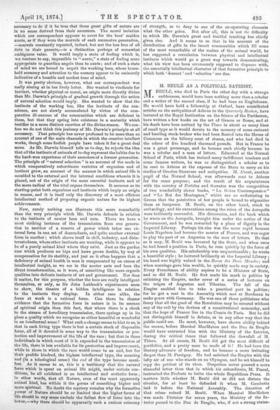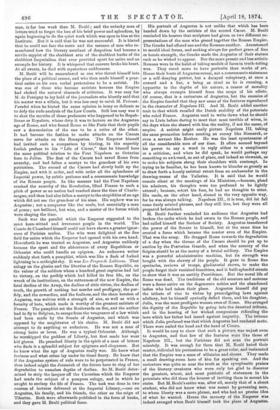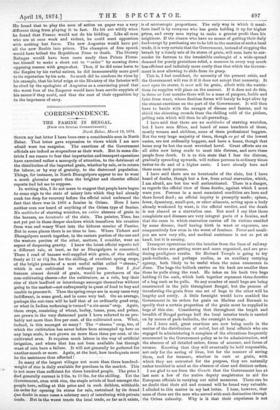M. BEIME AS A POLITICAL SATIRIST.
BEUL1.04, who died in Paris the other day with a strange .01, suddenness, would have been nothing more than a scholar and a writer of the second class, if he had been an Englishman. He would have held a fellowship at Oxford, have contributed articles on the antiquities of Athens to the Quarterly Review, have lectured at the Royal Institution on the friezes of the Parthenon, have written a few books on the art of Greece or Rome, and at his death have been noticed by the Times in about as many lines of small type as it would devote to the memory of some eminent and bustling stock-broker who had been floated into the House of Commons on the billowy crest of shares, and who bad died in the odour of five hundred thousand pounds. But in France he was a great personage, and he became such chiefly because he was a scholar and a man of letters. Educated at the Normal School of Paris, which has trained many indifferent teachers and some famous writers, he was so distinguished a scholar as to be sent to Athens at the expense of the State to carry on his studies of Grecian literature and antiquities. M. About, another pupil of the Normal School, was afterwards sent to Athens for the same purpose; and the result of his acquaintance with the country of Pericles and Socrates was the composition of two wonderfully clever books, "Li GI ece Contemporaine" and 6.'14 Roi des NIontagnes," which are so unflattering to Greece that the patriotism of her people is bound to stigmatise them as lampoons. M. Ben16, on the other hand, stuck to arch ology, and his excavations among the ruins of the Acropolis were brilliantly successful. His discoveries, and the book which he wrote on the Acropolis, brought him under the notice of the Government, and he was rewarded by a place of dignity in the Imperial Library. Perhaps his rise was the more rapid because Louis Napoleon had become the master of France, and was eager to play the part of an Augustus to the men of letters. Be that as it may, M. Beale was favoured by the State, and when once he had found a position in Paris, he rose quickly by the force of his own qualities. His scholarship was unquestionable ; he wrote a beautiful style ; he lectured brilliantly at the Imperial Library ; his hand was highly valued in the Revue des Deux Monde.; and when marriage gave him wealth, he quickly made way in society. Every Frenchman of ability aspires to be a Minister of State, and so did M. Beule. He first made his mark in politics by satirising the Empire, under cover of a series of lectures on the reigns of Augustus and Tiberius. The fall of the Empire enabled him to take a practical part in politics; for he got a seat in the Assembly which met at Bordeaux to make peace with Germany. He was one of those politicians who fancy that all the good of the Revolution may be secured without any of the evil by the devices of a constitutional monarchy, and that the hope of France lies in the Comte de Paris. But he did not distinguish himself in debate, or in any other way that the public could see. He must, however, have shown ability behind the scenes, before Marshal MacMahon and the Duc de Broglie would have entrusted him with the Ministry of the Interior, during the critical times that followed the downfall of M. Thiers. At all events, M. Beale did get the most difficult of portfolios, and a pretty mess he made of it ! He had been the literary advocate of freedom, and he became a more irritating despot than M. Persigny. He had satirised the Empire with the lofty air of one who stands on an Olympus, and he set himself to copy the pettiest of its vices. Despotism never penned a more shameful letter than that in which his subordinate, M. Pascal, instructed the Prefects to bribe the whole Republican Press. It matters little whether M. Beale did or did not dictate the circular, for at least he defended it when M. Gambetta laid it before the National Assembly. The detection of that crime ruined M. Beu16. When Marshal MacMahon was made Dictator for seven years, the Ministry of the In- terior passed to the Due de Broglie, who, if not a strong states.
licans or Royalists, whose duty it was to lecture on the Augustan say to Livia before daring to meet that most terrible of wives, in age of Rome, and who found Rome so like Paris that their pupils the days when she shared with him the reality, if not the name, of saw a denunciation of the one to be a satire of the other. empire. A satirist might easily picture Napoleon III. taking Is had become the fashion to make attacks on the Cmsars the same precaution before meeting an enemy like Bismarck, or serve for attacks on the Bonapartes. The Emperor himself even a servant like Rouher. He was the least spontaneous of had invited such a comparison by hinting, in the superbly all the considerable men of our time. It often seemed beyond foolish preface to his "Life of Car," that he himself bore his power to say a word in reply either to a compliment the same political relation to the First Napoleon as Octavius or a criticism, and when he did speak, be would perhaps say bore to Julius. The first of the Cm3ars had saved Rome from something so awkward, so out of place, and indeed so clownish, as anarchy, and bad fallen a martyr to the grandeur of his own to make his subjects shrug their shoulders with contempt. In patriotism. The second of the Cmsars had slowly built up the trying to be familiar, he has been known to blunder so grossly as Empire, and with it order, and with order all the splendours of to draw forth a keenly satirical retort from an ambassador in the Imperial power, by subtle patience and a consummate knowledge drawing-rooms of the Tuileries. It is said that he would of the Roman people. In like manner had the First Napoleon remain silent at the meetings of his Ministers,—because, plead crushed the anarchy of the Revolution, lifted France to such a his admirers, his thoughts were too profound to be lightly pitch of power as no nation had reached since the time of Charle- uttered ; because, retort his foes, he had no thoughts to utter. magne, and then had also fallen a martyr to the stupidities of an age His uncle, on the other hand, sinned in the very opposite way, which did not see the grandeur of his aims. His nephew was an for he was always talking. Napoleon III., it is true, did let fall Augustus ; not a conqueror like the uncle, but essentially a man some finely minted phrases, and they still live, but they were all of peace ; not brilliant, but wise, and a mister of the forces which prepared beforehand.
were shaping the time. M. Beule further reminded his audience that Augustus had Such was the parallel which the Emperor suggested to the broken the oaths which he had sworn to the Roman people, and most keen-witted and irreverent people in the world. The had called himself the Saviour of Society. Augustus transferred Comte de Chambord himself could not have shown a greater ignor- the power of the Senate to himself, but at the same time he ance of Parisian malice. The wits were delighted at the fine created a force which became the master even of the Empire. field for satire which the Emperor had opened with his own hand. That was the army. He dragged Rome towards the degradation Henceforth he was treated as Augustus, and Augustus suddenly of a day when the throne of the Cmsars should be put up to became the sport and the abhorrence of every Republican or auction by the Prmtorian Guards, and when the country of the Orleanist who could handle an epigram. An unknown writer Scipios should be at the mercy of a brutal soldiery. The Empire suddenly shot forth a pamphlet, which was like a flash of forked was a powerful administrative machine, but its strength was lightning in a midnight sky. It was Les Propos de Labienus. That bought with the slavery of the people. It gave to Rome fine eulogy on the glories and the liberties of the Roman Republic, on spectacles, reviews of troops, gladiatorial shows, to make the the valour of the soldiers whom a hundred great captains had led people forget their vanished franchises, and it built splendid streets to victory, on the perfidy which had killed its free life, on the to show that it was an earthly Providence. But the moral life of wreck of its institutions, on the rottenness of the new Empire, the Rome was dead. The traditions of the old senators and matrons fatal decline of the Army, the decline of civic virtue, the decline of were a fierce satire on the degenerate nobles and the abandoned truth, the growth of nothing but murder and profligacy, the per- ladies who had taken their place. Augustus himself did pay fidy, and the cowardice, and the foulness, and the sham heroism of the tribute of vice to virtue by promulgating laws against Augustus, was written with a strength of aim, as well as with a adultery, but he himself cynically defied them, and his daughter, ferocity of hate, which made it worthy of the greatest satirists of Julia, was the most profligate woman even of Rome. She avenged France. The pamphlet set the Boulevards on fire, and the author the dignity of the Republic by going into the deserted tribune, had to fly to Belgium, to escape from the vengeance of a law which and in the hearing of her wicked companions ridiculing the had been made by the Senate of Augustus, and which was laws which her father had issued against impurity. The tribune opposed by the magistrates of his choice. M. Beule did not which Julia profaned was that which Augustus had rendered mute. attempt to do anything so audacious. He was not a man of There were nailed the head and the hand of Cicero.
strong hates or loves. He was a typical Orleanist. Although It would be easy to show that such a picture was unjust even he worshipped the goddess of Liberty, but first made her wear to Augustus, and that few of the features were like those of kid gloves. He preached liberty in the spirit of a man of letters Napoleon III., but the Parisians did not scan the portrait who finds it a splendid subject for epigrams and eloquence. But minutely. It was enough for them that M. Beule hated their he knew what the age of Augustus really was. He knew what master, ridiculed his pretensions to be a great ruler, and insinuated foulness and what crime lay under its tinsel finery. He knew that that the Empire was a mass of villainies and shams. They made if the Augustan system of rule were to be perpetuated in France, a small drawing-room hero of him for speaking out. And the then indeed might the Jeremiah of the future have to sing of her caricature was quite as near the truth as the sycophantic praises degradation to nameless depths of decline. So M. Beule deter- of the literary creatures who were only too glad to discover mined to strip the lacquer off the Cmsarism which the Emperor the greatest, wisest, and most patriotic of statesmen in the Lad made the subject of a pompous eulogy, and in which be potentate who did them the honour of inviting them to mount his sought to enclasp the life of France. The task was done in two stairs. But M.Beuld's satire was, after all, merely that of a closet courses of lectures delivered at the Imperial Library,—one on student, who did not know what was meant by governing men, Augustus, his family, and his friends, the other on the reign of to whom liberty was a mere phrase, and who had no precise idea Tiberius. Both were afterwards published in the form of books, of what he wanted. Hence the memory of the Emperor was and they gave M. Beale political fame. indeed avenged when Beale himself took the place of Augustus. man, is far leas weak than M. Bente ; and the unlucky man of His portrait of Augustus is not unlike that which has been letters tried to forget the loss of his brief power and splendour, by handed down by the satirists of the second Car. M. Bessie again beginning to do the quiet work which was open to him at the reminded his hearers that sculpture had given us two different re- Institute. But it is said that he was not successful. It is hinted presentations of the man who pieced together the Roman Empire. that be could not face the scorn and the sarcasm of men who re- The Greeks bad offered one and the Romans another. Accustomed membered how the literary assailant of despotism had become a to mould ideal forms, and seeking always for perfect grace of line servile copyist of the shabbiest arts of the shabbiest hacks of the or heroic strength, the Greeks made the Augustus of their statues shabbiest Imperialism that ever provided sport for satire and an such as he wished to appear. But the more prosaic and less artistic example for history. It is whispered that censure broke his heart. Romans were in the habit of taking models of faces in truth-telling At all events, he died with mysterious suddenness. wax. They cared more to have portraits than works of art.
M. Bente will be remembered as one who thrust himself into Hence their busts of Augustus reveal, not a consummate statesman the place of a political censor, and who then made himself a prac- or a self-denying patriot, but a decayed voluptuary, at once a tical satire on his own verbal pretensions to be a satirist. He coward and a liar, a being as cruel as he is cunning, a was one of those who become satirists because the Empire hypocrite to the depths of his nature, a censor of morality had choked the natural channels of criticism. It was easy for who always exempts himself from the scope of his edicts.
M. de Persigny to lay hold of the journalists who bluntly said that Of course, that is a caricature of Augustus, but the enemies of his master was a villain, but it was less easy to catch M. Prevost- the Empire fancied that they saw some of the features reproduced Paradol when he hinted the same opinion in irony so delicate as in the character of Napoleon III. And M. Beale added another to defy the rude analysis of the Law Courts. Still less easy was it trait to that which recalled the Dutch stolidity of the potentate to shut the mouths of those professors who happened to be Repub- who ruled France. Augustus used to write down what he should licans or Royalists, whose duty it was to lecture on the Augustan say to Livia before daring to meet that most terrible of wives, in age of Rome, and who found Rome so like Paris that their pupils the days when she shared with him the reality, if not the name, of saw a denunciation of the one to be a satire of the other. empire. A satirist might easily picture Napoleon III. taking Is had become the fashion to make attacks on the Cmsars the same precaution before meeting an enemy like Bismarck, or serve for attacks on the Bonapartes. The Emperor himself even a servant like Rouher. He was the least spontaneous of He found that to play the man of action on paper was a very different thing from playing it in fact. He hit out wildly when be found that France would not do his bidding. Like all men who are at once weak and violent, be could meet opposition with nothing but force. The new Augustus would have put all the new Beules into prison. The champion of free speech would have bribed the Republican Press to death. The literary Rabagas would have been more ready than Prince Flores- tan himself to make a short cut to " order " by mowing down opposing masses with grape-shot. Thus, if he did some harm to the Empire by his verbal satires, he did immeasurably more good to its reputation by his acts. So much did he condone its vices by his example, that his brief reign at the Ministry of the Interior will be cited by the apologists of Augustus as a convincing proof that the worst foes of the Emperor would have been servile copyists of his career if they could, and that the root of their opposition lay in the impotence of envy.




































 Previous page
Previous page